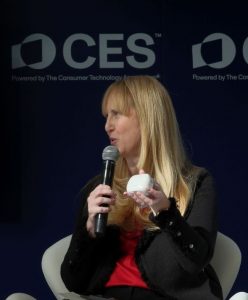Circular Economy Editor, Cynthia Milota, connected with Andrea Murphy, Director Environmental Affairs Panasonic North America to celebrate WorkDesign’s month of Workplace Sustainability Beyond Carbon Neutrality.
Changing course and getting out of my comfort zone shaped my career trajectory.
Always loving science and starting out in marine biology, Andrea Murphy had a change of heart, when it came to her college major. “I wouldn’t have found environmental science… if I hadn’t made a pivot and didn’t get stuck when the first thing didn’t work out.”

As the Director of Environmental Affairs for Panasonic North America, Andrea integrates her experiences in consulting, local government, telecom, finance and compliance to see the big picture, but also to be very technical. “When I was looking for jobs, Panasonic had good data, smart aspirations and offered products that improved society.”
Her commitment to sustainability and the circular economy permeates not only her work life, but also her personal mission. Andrea is a member of her community’s environmental commission, which through education and outreach, encourages citizens to incorporate environmentally responsible practices into their homes, properties and daily lives.
Translating Principles into Action
Panasonic’s Seven Principles resonate with Andrea’s personal world view.
- Contribution to society
- Fairness & honesty
- Cooperation & team spirit
- Untiring effort for improvement
- Courtesy & humility
- Adaptability
- Gratitude
These ideas, engrained in Japanese society and the Panasonic business culture, show a respect for resources and employee wellbeing, before it became a corporate slogan. Mottainai is a Japanese concept that Panasonic embraces to promote sustainability and environmental protection. Panasonic has been reporting on their sustainability initiatives since 1999, so when Andrea began to measure KPIs with her team, they had decades of data to track progress.
With over 1 billion people across the globe using Panasonic products every day, there is a big responsibility to reduce the carbon footprint of these products.
Andrea’s team navigates the regulatory standards, understands that customers will buy a product with more recycled content and want to be able to compare products to make informed decisions.
GREEN IMPACT
The Panasonic GREEN IMPACT initiative is built on three pillars and Circular Economy business models.
Panasonic’s Own Impact
- Committing to decarbonize, cut emissions and be net zero CO2 across all factories by 2030
Contribution Impact
- Helping customers avoid CO2 emissions by increasing production of EV batteries, energy saving technologies such as air to water heat pumps and hydrogen fuel cells.
Future Impact
- Innovating and investing in new technologies such as next generation solar panels
Circular Economy Models
- Maximizing the product lifetime and maintaining the material value with a focus on circular business models and product design, extended servicing, and further enhancing recycling activities.
- Minimizing the use of materials and extending the usage of recycled and renewable materials.
- Taking a collaborative approach with customers and partners for establishing circularity-oriented business operations, information sharing, and product usage options.

Andrea and her team manage federal, state and global standards for sustainability. She is particularly proud of the Panasonic Take Back for Tomorrow program for recycling electronics. After registering with Panasonic MultiShape, the company will generate a pre-paid label for consumers to pack and ship their end-of-life products.
In the US, Panasonic has partnered with MRM Recycling, ERI and Redwood Materials to collect used electronics (such as shavers, trimmers, toothbrushes, etc. – any brand) from consumers and recycle the components. The most valuable component is the battery, which goes to Redwood Materials, where they extract lithium cobalt and nickel and then re-use them as feedstock to make new batteries.
Because the emissions from use of our products are much larger than from their production, our focus is to drive forward circular economy measures to reduce the carbon footprint of the products we produce.
Make a Bigger Tent
No stranger to the stage, Andrea is a frequent speaker at industry events, most recently two 2025 CES panels. As president of the Electronics Manufacturers Recycling Management Company (MRM), she works with about 50 OEMs supporting electronics recycling laws in the US.
Andrea supports Panasonic’s leadership role at Call2Recycle, an educational based nonprofit, which provides collection services on behalf of their stewards to responsibly manage the end of life of batteries.
Panasonic was an early supporter of the Extended Producer Responsibility (EPR) concept, where the manufacturer or the brand owner take operational and/or financial responsibility for a product at the end of its useful life.
There are now many states which have EPR laws in place and for many products. But when battery waste became a hot topic in early 1994, Panasonic along with other battery manufacturers stepped up and created RBRC, (Rechargeable Battery Recycling Corporation), which is now known as Call2Recycle.
Andrea is encouraged by industry partnerships as an efficient way to promote circularity amongst industries. At Circularity 24 partnerships were apparent with the wide range of services providers and vendors. Andrea and her team participated in a packaging session led by a large tech company. The session focused on removing plastic from packaging. They actually gave out samples with details and a link to a website with specifications. She cites this as a prime example of a partnership that could only happen with transparent collaboration.
Mentoring the Next Gen
Getting yourself out there, out of your comfort zone, helps to make connections. Also, do your research on companies. “I did a lot of research on Panasonic before I took the job. I certainly wasn’t going to take this role for a company that didn’t stand behind and have the documentation behind what they’re doing, so make sure you’re choosing the right company. Some jobs could be flashy but if you really care, you’ll find the right fit for you,” (Murphy, 2024).
Andrea’s advice for the next generation of environmental professionals:
be curious, ask a lot of questions and get involved
References
Murphy, A., (November 2023), “Advancing Environmental Sustainability with Andrea Murphy of Panasonic North America,” Retrieved from: https://impactpodcast.com/episode/2023/11/advancing-environmental-sustainability-with-andrea-murphy-of-panasonic-north-america/


